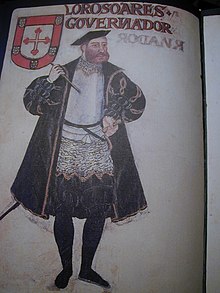Lopo Soares de Albergaria
Dom Lopo Soares de Albergaria , also: Lopo Soares de Alvarenga, (* around 1460 in Portugal , † after 1520 in Torres Vedras , Portugal) was a Portuguese navigator, military and third governor general of the Estado da Índia .
Live and act
D. Lopo Soares de Albergaria came from the high nobility. He was the fourth son of Rui Gomes de Albergaria, who held the office of Chancellor of the Empire (chanceler-mor) at the time of Alfonso V, and of D. Mécia Soares de Melo. He married D. Joana de Albuquerque, sister of Tristão da Cunha , the commander-in-chief of the fleet that set out for India in 1506. Through his marriage and his family he had close family ties to many actors in the Estado da Índia.
Although he was brought up at the royal court and Fidalgo of the royal house, as “only” the fourth born son, he was not entitled to inheritance. Like many other nobles, he looked overseas for income and fame. From 1495 to 1499 he was the representative of the king (capitão-mor) in São Jorge da Mina . This was one of the most important and lucrative offices that the Portuguese king had to bestow. In 1504 the Portuguese king appointed him commander-in-chief of the royal Indian fleet in 1504. This 13-ship fleet left Lisbon on April 22, 1504 under Lopo Soares de Albergaria for India, which it reached in September of the same year. This fleet performed the typical tasks of an Indian fleet: it circled the Cape of Good Hope, loaded spices in India, took on military and diplomatic tasks at the same time, supplied the Portuguese fleet, which was permanently stationed in India, with ships, people and artillery and returned to Europe the following year .
The income from the gold of São Jorge da Mina in the years 1495–99 and from the Indian pepper trade in 1504/05 formed the basis of his considerable fortune.
In 1515 he was reappointed commander-in-chief of an Indian fleet of 13 ships. As the new governor of the Estado da Índia, he was supposed to replace the successful Afonso de Albuquerque , but to continue his policy of establishing Portuguese rule in the Indian Ocean and to prevent Muslim trade with Venice by attacking the access routes of the Red Sea . The commanders of his ships should therefore not return to Portugal, but occupy the most important offices in the Estado da Índia for some time. For example, after the arrival of the fleet, the commanders of the most important fortresses in Sofala , Goa , Cannanore , Calicut , Cochin and Malacca were exchanged. With the appointment of Lopo Soares de Albergaria, the opponents and personal enemies of Afonso de Albuquerque had prevailed at the court in Lisbon. The historian Luís de Albuquerque, in his Dicionário de História dos Descobrimentos (Lexicon of the History of the Discoveries), regarded the government of Lopo Soares as an expression of the retreat of the central power of the king against the claims of the nobility, the merchants and everyone who saw the growth of surveillance viewed the crown as a constriction of their activities. During his reign, Fernão Pires de Andrade's expedition to China started from Goa in February 1516, in which Tomé Pires also took part.
D. Lopo Soares de Albergaria could not build on the successes of Afonso de Albuquerque with his political and military actions. His attack on the port and fortress city of Djidda in the Red Sea, which was repulsed by the Turks with considerable losses, particularly diminished his reputation at the Portuguese court. The Portuguese historian Jaime Cortesão assumes that around half of the sailors and soldiers perished in the Red Sea as a result of accidents, illness, hunger and thirst.
Before he was recalled to Portugal in 1519, he succeeded in building a Portuguese fortress in Colombo in February 1518 with the consent of the local ruler . This created the prerequisites for submitting today's Sri Lanka and thus the lucrative cinnamon trade to Portuguese influence for about a century. He returned to Portugal because of his politics in India, because of waste and the like. a. To answer for allegations. He retired to his estate in Torres Vedras , where he probably also died.
In several cities in Portugal, such as Porto and Barreiro , streets are named after him.
literature
- Albuquerque, Luís (Dir.), Dicionário de História dos Descobrimentos Portugueses, 2 vols., Lisboa (Círculo de Leitores) 1994.
- Carvalho, Maria João Loução de, Gaspar Correia e dois perfis de governador: Lopo Soares de Albergaria e Diogo Lopes de Sequeira: em busca de uma causalidade, Lisboa (Universidade Aberta) 2009, Dissertação de Mestrado, 282 p. Including appendix, Portuguese text
- Cortesão, Jaime, Os Descobrimentos Portugueses, Lisboa (Livros Horizonte) 1984.
- Lacerda, Teresa, Os Capitães das Armadas da Índia no reinado de D. Manuel I - uma análise social, Lisboa (Universidade Nova de Lisboa, Faculdade de Ciências Sociais e Humanas, Departamento de História) 2006, Dissertação de Mestrado, 258 pp., Portuguese text
Remarks
- ^ Lacerda, 2006: 186
- ^ Lacerda, 2006: 186
- ^ Lacerda, 2006: 46
- ^ Lacerda, 2006: 68
- ↑ so in Carvalho, 2009: 107
- ^ Carvalho, 2009: 110
- ↑ so in Carvalho, 2009: 112
- ^ Carvalho, 2009: 112
See also
Web links
- Leonel Vicente: Lopo Soares de Albergaria. January 19, 2007
- Lopo Soares de Albergaria. In: Infopédia. Porto Editora, Porto 2003-2014
- Lopo Soares de Albergaria, governador da India. In: Geneall
| personal data | |
|---|---|
| SURNAME | Albergaria, Lopo Soares de |
| BRIEF DESCRIPTION | Portuguese navigator and third Governor General of the Estado da India |
| DATE OF BIRTH | around 1460 |
| PLACE OF BIRTH | Portugal |
| DATE OF DEATH | around 1520 |
| Place of death | Portugal |
